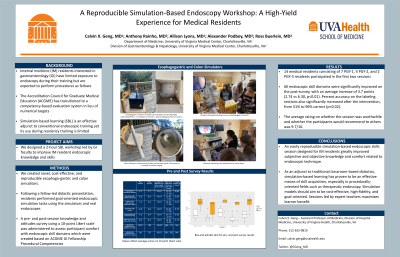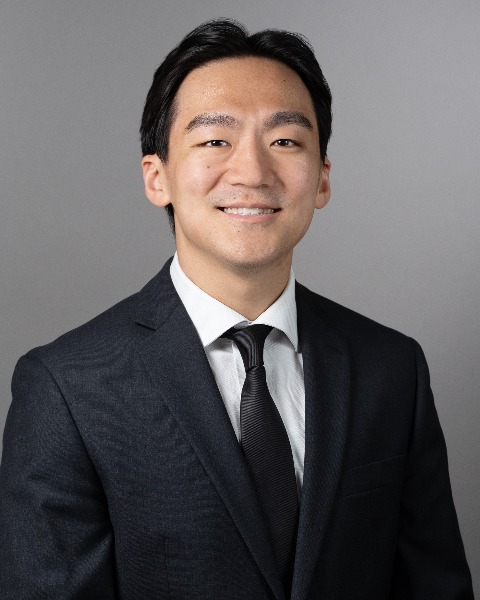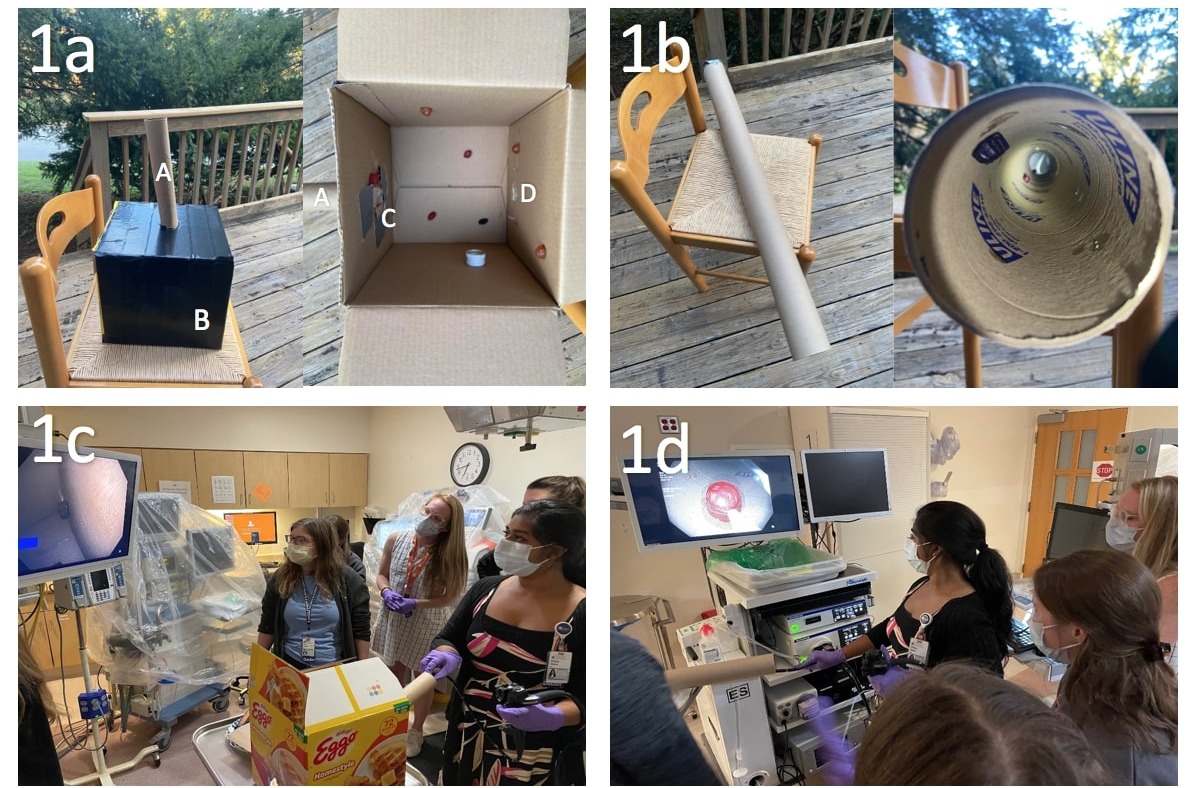Monday Poster Session
Category: General Endoscopy
P2371 - A Reproducible Simulation-Based Endoscopy Workshop: A High-Yield Experience for Medical Residents
Monday, October 28, 2024
10:30 AM - 4:00 PM ET
Location: Exhibit Hall E


Calvin Geng, MD
University of Virginia
Charlottesville, VA
Presenting Author(s)
Calvin Geng, MD1, Anthony Rainho, MD1, Lindsey Bierle, DO1, Zachary Boggs, MD1, Allison Lyons, MD1, Jason Erno, MD2, Alexander Podboy, MD1, Ross Buerlein, MD1
1University of Virginia, Charlottesville, VA; 2University of Virginia Medical Center, Charlottesville, VA
Introduction: Internal medicine (IM) residents in The United States interested in GI have limited exposure to endoscopy during their training but are expected to perform procedures when they start fellowship. Simulation-based learning (SBL) is an effective adjunct to conventional endoscopic training yet its use during residency training is limited. We present an easily-reproducible, SBL session for IM residents designed to improve their endoscopic knowledge and skills prior to fellowship.
Methods: We designed a 2-hour workshop led by a GI fellow and attending using novel esophagogastric and colon simulators (Figure 1). Participants completed team-based, goal-oriented endoscopic tasks using real endoscopes. A pre- and post-session knowledge and attitudes survey using a 10-point Likert scale was administered to assess mastery of 5 basic endoscopic skill domains created using GI Fellowship Competency Benchmarks published by the ACGME. The domains surveyed included 1) familiarity with the endoscope buttons, 2) familiarity with endoscope technique, 3) comfort in setting up the endoscope station, 4) familiarity with the concept of torque, 5) understanding of intraluminal loops. There were 2 labeling sections assessing functions of the endoscope buttons. This curriculum was approved by UVA IRB protocol SBS5625.
Results: 15 medical residents participated during 2 separate sessions. All endoscopic skill domains were significantly improved post-simulation (Table 1), with an average increase of 3.66 points out of 10 (2.64 vs 6.3, p< 0.01). Accuracy on the labeling sections also increased, from 51% to 96% correct (p< 0.02). To assess the longer-lasting effects of the session, 8 participants completed the survey 4 weeks after the session, and the average score was 5.12/10 across all domains, which remained significantly higher than the pre-session average of 2.64 (p< 0.01).
Discussion: An easily reproducible simulation-based endoscopic skills session facilitated behavioral and experiential learning and improved IM residents’ endoscopic technique prior to fellowship. This initiative fills a crucial need for cost-effective and reproducible SBL opportunities for medical trainees interested in GI and also highlights key features of successful SBL that are needed when designing any simulation learning curriculum. Cost-effectiveness analysis is needed to compare benefits of this curriculum with those that use more expensive simulators such as the Thompson Endoscopic Skills Trainer.

Note: The table for this abstract can be viewed in the ePoster Gallery section of the ACG 2024 ePoster Site or in The American Journal of Gastroenterology's abstract supplement issue, both of which will be available starting October 27, 2024.
Disclosures:
Calvin Geng, MD1, Anthony Rainho, MD1, Lindsey Bierle, DO1, Zachary Boggs, MD1, Allison Lyons, MD1, Jason Erno, MD2, Alexander Podboy, MD1, Ross Buerlein, MD1. P2371 - A Reproducible Simulation-Based Endoscopy Workshop: A High-Yield Experience for Medical Residents, ACG 2024 Annual Scientific Meeting Abstracts. Philadelphia, PA: American College of Gastroenterology.
1University of Virginia, Charlottesville, VA; 2University of Virginia Medical Center, Charlottesville, VA
Introduction: Internal medicine (IM) residents in The United States interested in GI have limited exposure to endoscopy during their training but are expected to perform procedures when they start fellowship. Simulation-based learning (SBL) is an effective adjunct to conventional endoscopic training yet its use during residency training is limited. We present an easily-reproducible, SBL session for IM residents designed to improve their endoscopic knowledge and skills prior to fellowship.
Methods: We designed a 2-hour workshop led by a GI fellow and attending using novel esophagogastric and colon simulators (Figure 1). Participants completed team-based, goal-oriented endoscopic tasks using real endoscopes. A pre- and post-session knowledge and attitudes survey using a 10-point Likert scale was administered to assess mastery of 5 basic endoscopic skill domains created using GI Fellowship Competency Benchmarks published by the ACGME. The domains surveyed included 1) familiarity with the endoscope buttons, 2) familiarity with endoscope technique, 3) comfort in setting up the endoscope station, 4) familiarity with the concept of torque, 5) understanding of intraluminal loops. There were 2 labeling sections assessing functions of the endoscope buttons. This curriculum was approved by UVA IRB protocol SBS5625.
Results: 15 medical residents participated during 2 separate sessions. All endoscopic skill domains were significantly improved post-simulation (Table 1), with an average increase of 3.66 points out of 10 (2.64 vs 6.3, p< 0.01). Accuracy on the labeling sections also increased, from 51% to 96% correct (p< 0.02). To assess the longer-lasting effects of the session, 8 participants completed the survey 4 weeks after the session, and the average score was 5.12/10 across all domains, which remained significantly higher than the pre-session average of 2.64 (p< 0.01).
Discussion: An easily reproducible simulation-based endoscopic skills session facilitated behavioral and experiential learning and improved IM residents’ endoscopic technique prior to fellowship. This initiative fills a crucial need for cost-effective and reproducible SBL opportunities for medical trainees interested in GI and also highlights key features of successful SBL that are needed when designing any simulation learning curriculum. Cost-effectiveness analysis is needed to compare benefits of this curriculum with those that use more expensive simulators such as the Thompson Endoscopic Skills Trainer.

Figure: Figure 1
1a: Upper endoscopy simulator
EGD simulator as viewed externally (left) and internally (right). Labels designated as A: esophagus; B: stomach; C: gastroesophageal junction; D: pylorus
1b: Colon simulator
1c: Residents attempting retroflexion on EGD simulator
1d: Residents attempting snare polypectomy of distal colonic polyp
1a: Upper endoscopy simulator
EGD simulator as viewed externally (left) and internally (right). Labels designated as A: esophagus; B: stomach; C: gastroesophageal junction; D: pylorus
1b: Colon simulator
1c: Residents attempting retroflexion on EGD simulator
1d: Residents attempting snare polypectomy of distal colonic polyp
Note: The table for this abstract can be viewed in the ePoster Gallery section of the ACG 2024 ePoster Site or in The American Journal of Gastroenterology's abstract supplement issue, both of which will be available starting October 27, 2024.
Disclosures:
Calvin Geng indicated no relevant financial relationships.
Anthony Rainho indicated no relevant financial relationships.
Lindsey Bierle indicated no relevant financial relationships.
Zachary Boggs indicated no relevant financial relationships.
Allison Lyons indicated no relevant financial relationships.
Jason Erno indicated no relevant financial relationships.
Alexander Podboy indicated no relevant financial relationships.
Ross Buerlein indicated no relevant financial relationships.
Calvin Geng, MD1, Anthony Rainho, MD1, Lindsey Bierle, DO1, Zachary Boggs, MD1, Allison Lyons, MD1, Jason Erno, MD2, Alexander Podboy, MD1, Ross Buerlein, MD1. P2371 - A Reproducible Simulation-Based Endoscopy Workshop: A High-Yield Experience for Medical Residents, ACG 2024 Annual Scientific Meeting Abstracts. Philadelphia, PA: American College of Gastroenterology.

